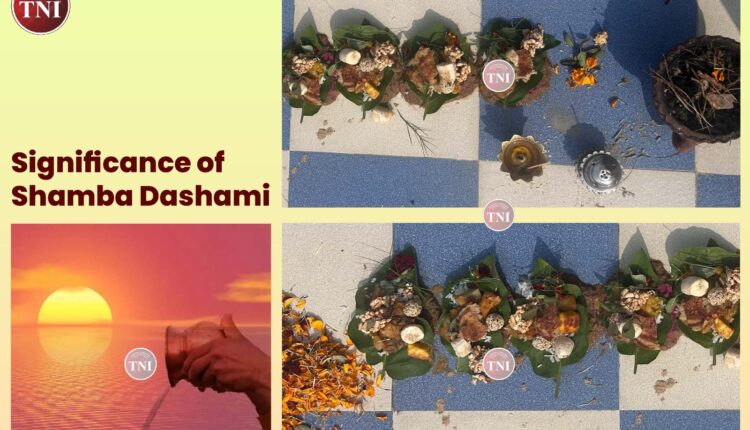Shamba Dasami: A Celebration of Devotion and Healing
Rooted in ancient mythology and woven into the cultural fabric of the region, this festival honors the Sun God, Surya, as a divine source of energy, vitality, and healing.
Shamba Dasami, a vibrant and spiritually significant festival, is a cherished celebration in the state of Odisha. Rooted in ancient mythology and woven into the cultural fabric of the region, this festival honors the Sun God, Surya, as a divine source of energy, vitality, and healing. Observed on the tenth day of the waxing moon in the Hindu month of Pausha, Shamba Dasami is a day when prayers ascend to the heavens for the well-being and longevity of children, particularly through the devotion of their mothers.
The story of Shamba Dasami finds its origins in the legend of Shamba, the son of Lord Krishna. According to mythology, Shamba, known for his youthful arrogance, was cursed with leprosy due to his transgressions. In his quest for healing, he sought the blessings of Surya Dev, embarking on an arduous penance on the banks of the Chandrabhaga River in Konark. His unwavering devotion and asceticism moved the Sun God, who ultimately cured him of his ailment. This tale of redemption and divine grace forms the foundation of Shamba Dasami, celebrated as a day of hope, faith, and healing.
The legend of Shamba’s penance and subsequent healing is closely tied to the Sun Temple of Konark, a UNESCO World Heritage Site and one of India’s architectural marvels. It is believed that Shamba constructed a temple dedicated to the Sun God at the site of his penance to express his gratitude. While the current temple was built centuries later by King Narasimhadeva I of the Eastern Ganga dynasty in the 13th century, it is considered a continuation of the tradition initiated by Shamba.
The architectural grandeur of the Sun Temple, designed in the form of a colossal chariot drawn by seven horses, symbolizes the Sun God’s cosmic journey. The temple remains a focal point for the worship of Surya, particularly during Shamba Dasami.
Over centuries, the story of Shamba’s penance became an integral part of Odisha’s cultural and religious identity. Shamba Dasami evolved as a festival to honor the Sun God and commemorate the miraculous healing of Shamba. Women, particularly mothers, began observing this day with prayers and rituals for the health and longevity of their children, drawing inspiration from the protective and healing aspects of the Sun God.
The festival reflects ancient Hindu cosmology, which views the sun as a vital force sustaining life on Earth. It also highlights the interplay between mythology, nature, and spirituality in Indian culture.
Support Independent Journalism? Keep us live.
The emphasis on the Sun God in Shamba Dasami aligns with ancient Vedic practices, where Surya was worshipped as a primary deity. The Atharva Veda and Rig Veda contain hymns dedicated to the Sun God, praising his power to dispel darkness and disease. Shamba Dasami can be seen as a regional extension of this Vedic tradition, with specific roots in Odisha’s mythology and landscape.
The festival’s rituals, such as offering arghya (water) to the rising or setting sun, can also be traced to ancient solar worship practices. These acts symbolize gratitude to the Sun God for his life-giving energy and healing powers.
On the morning of Shamba Dasami, a unique spiritual energy fills the air as women rise before dawn to perform their rituals. Dressed in traditional attire, they make their way to nearby rivers, ponds, or water bodies to take a ritualistic bath, symbolizing purification of body and soul. Afterward, they prepare offerings for the Sun God, including flowers, fruits, and specially crafted delicacies such as pithas (rice cakes) and khichdi.
The act of worship is a deeply moving sight. With their faces turned to the rising or setting sun, mothers fold their hands in reverence and recite prayers for the health and happiness of their children. This act reflects not only their devotion to Surya Dev but also the profound love and care they hold for their families. The prayers are accompanied by the narration of the Shamba Dasami Vrata Katha, the story of Shamba’s redemption, which serves as both a spiritual guide and a moral lesson.
The culinary traditions of Shamba Dasami are as vibrant and meaningful as the festival itself. In Odisha, food plays a central role in the rituals, reflecting the rich cultural heritage of the region. The dishes prepared on this occasion are deeply symbolic and rooted in local traditions, often highlighting ingredients that are considered pure and auspicious.
Shamba Dasami is more than a religious observance; it is a celebration of the bond between mothers and their children, a tribute to the nurturing power of nature, and a reaffirmation of faith in the divine. Through the rituals, prayers, and stories, this festival continues to resonate with timeless values, bringing communities together in shared devotion.
For the people of Odisha, Shamba Dasami is a day to celebrate resilience, healing, and the life-giving power of the sun. It is a reminder of the enduring belief that faith and dedication can illuminate even the darkest corners of life, much like the Sun God himself.


Comments are closed.